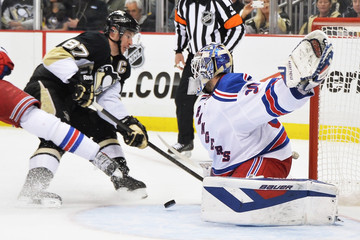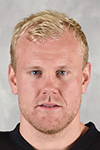 GAME 3 ANALYSIS
GAME 3 ANALYSIS(Rangers lead series, 2-1)
The New York Rangers took Game 3 with a 2-1 victory over the Pittsburgh Penguins on Monday night.
Carl Hagelin scored a first period breakaway goal and Chris Kreider also scored for the Rangers in the win. Henrik Lundqvist had an easy night until the final 10-12 minutes of the game, turning aside 23 shots in the win.
Patric Hornqvist scored the Penguins lone goal in the loss. The Penguins have lost six of their eight playoff home games.
The Penguins were held to just three shots in the first period and had 11 shots total after two periods. Trailing 2-0 at the start of the third period, the Penguins outshot the Rangers 13-7 in the third.
Overall the Rangers held a 26-24 advantage in shots on the night.
 –Alain Vigneault is regarded as one of the top head coaches in the game and you saw why tonight in how Vigneault adjusted to what the Penguins did successful in Game 2 and the Rangers put on a clinic in the first 45 minutes of the game, totally controlling the play, taking away the Penguins time and space, and causing the Penguins fits on the forecheck.
–Alain Vigneault is regarded as one of the top head coaches in the game and you saw why tonight in how Vigneault adjusted to what the Penguins did successful in Game 2 and the Rangers put on a clinic in the first 45 minutes of the game, totally controlling the play, taking away the Penguins time and space, and causing the Penguins fits on the forecheck.“They played really good,” Patric Hornqvist said of the Rangers. “We have to give credit to them.”
In Game 2 the Penguins countered the Rangers successful forecheck from Game 1 in stretching a weak side winger. It helped the Penguins d-men have an open outlet and avoid pressure quickly.
Tonight the Rangers strategically game planned with cross-ice dump in’s and it caused the Penguins fits all night. They sent one winger hard and had excellent placement on their cross ice dumps and by the time a Penguins d-man had to turn and retrieve the puck, the Rangers had immediate pressure.
The Penguins inability to have clean breakouts, took away from their ability to attack the Rangers through the neutral zone and the middle of the ice where they were successful in periods two and three in Game 2.
“Whether it was getting on the forecheck or getting out of our end a little quicker, we just didn’t execute very well,” Sidney Crosby said of the Penguins struggles in the first two periods.
Another adjustment the Rangers made in the neutral zone with back pressure and the d-zone in swarming the Penguins down low in the defensive zone. Pittsburgh was unable to create offense off their cycle as the Rangers center support was much tighter and their wingers seemed to play lower than they did in games 1 and 2 to combat the Penguins cycle.
Those adjustments played a big factor in the Rangers taking away the Penguins time and space.
Penguins head coach Mike Johnston cited poor shot selection as part of the reason for the Penguins struggles to generate offense early, but a lot had to do on the different looks New York gave the Penguins defensively compared to Games 1 and 2.
“I thought early, I didn’t like our shot selection,” Johnston said. “We forced a lot of plays in the first period and we can’t do that.”
“Really in the third period, loose puck battles, our intensity got to the level it needed to be.”
 – Trailing 2-0 the Penguins inevitable push came in the third period with around 12 minutes left in regulation and Pittsburgh’s strong push lasted until the final buzzer.
– Trailing 2-0 the Penguins inevitable push came in the third period with around 12 minutes left in regulation and Pittsburgh’s strong push lasted until the final buzzer.New York sat back and Pittsburgh took advantage with a couple glorious chances.
Patric Hornqvist finally broke through with 6:48 remaining to cut the Rangers lead to 2-1 but Lundqvist would come up huge down the stretch to preserve the win.
The best thing David Perron did all night was getting the Penguins into a four-on-four situation with 3:29 left in the third as Perron and Dan Boyle each went off for penalties. The Penguins, though, failed to take advantage of the open ice and didn’t register a shot during four-on-four play.
As encouraging as the Penguins play was in the final 10-12 minutes of the game, you can’t dictate the play for only a short stretch in a hockey game like the Penguins did tonight and expect to win in the playoffs, especially when the opponent has Henrik Lundqvist as their goaltender.
“We have to be better. Our third period was great and our first two weren’t very good,” Patric Hornqvist said. “Don’t know if they did something to us or we weren’t ready to go. We have to be better.”
